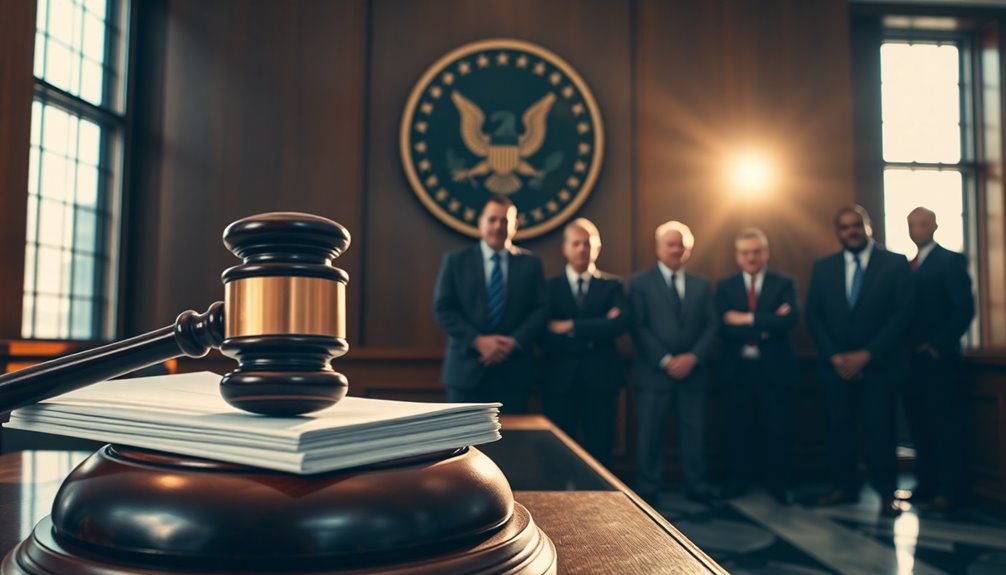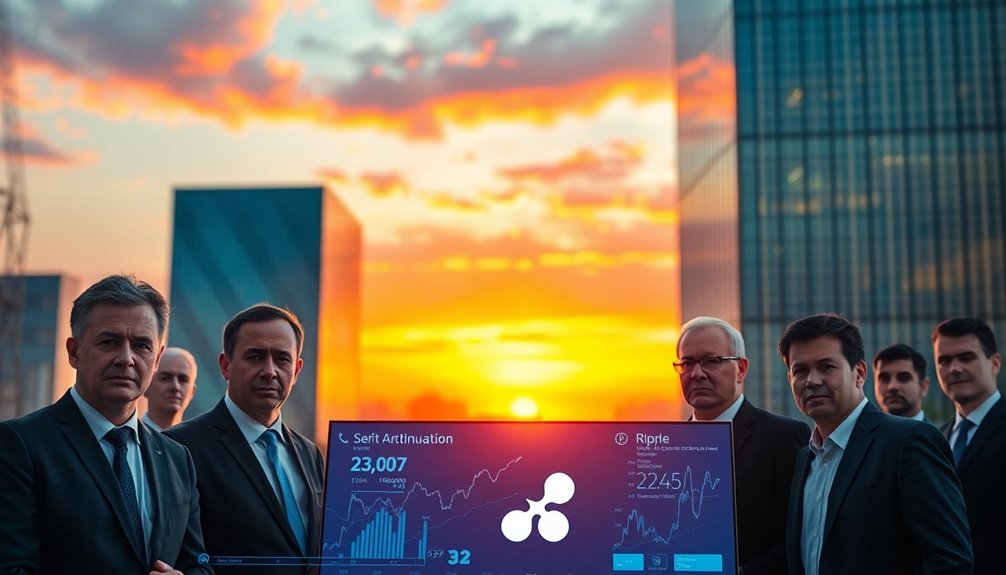Ripple just fired back at the SEC by filing a cross-appeal, challenging the SEC's claims regarding XRP's legal status. They aim to clarify the definition of "investment contract" and dispute the SEC's assertion that all retail XRP transactions qualify as securities. This move comes after a recent court ruling stated that XRP isn't a security, which the SEC is appealing. Ripple's leadership criticizes the SEC's approach, labeling it as repetitive and unproductive. The outcome of these appeals could greatly impact the regulatory landscape for cryptocurrencies. Stick around to see how this unfolds and what it means for the market.
Key Takeaways
- Ripple filed a cross-appeal against the SEC on October 10, 2024, challenging the agency's interpretation of XRP as a security.
- The cross-appeal seeks clarification on the definition of "investment contract" in relation to XRP sales and transactions.
- Ripple argues that the SEC's appeal misrepresents the court's ruling that XRP is not a security for retail transactions.
- CEO Brad Garlinghouse criticized the SEC's actions, labeling their arguments as repetitive and ineffective.
- Ripple aims for clearer regulations to enhance investor confidence and reshape the cryptocurrency regulatory landscape.
Ripple's Legal Strategy Unfolds

Ripple's legal strategy is taking shape as it files a cross-appeal against the SEC on October 10, 2024. This move aims to challenge the SEC's appeal and clarify issues concerning XRP's legal status. By doing this, Ripple guarantees all legal bases are covered, particularly regarding the definition of an "investment contract." The SEC's appeal, filed just days earlier, disputes a court ruling that XRP isn't a security, claiming it contradicts longstanding Supreme Court precedents. As both sides prepare for review by the appellate court, the outcome could greatly influence the regulatory landscape for cryptocurrencies. Ripple's stance argues that XRP doesn't meet the criteria for an investment contract, setting the stage for a critical legal battle. Notably, the SEC's approach is characterized as regulation through enforcement, which raises questions about the future of crypto regulations.
SEC Case Developments Update

As the legal battle intensifies, the SEC has filed an appeal against a district court ruling on XRP sales, asserting that all retail transactions qualify as securities under the Howey Test.
The SEC argues that retail investors buying XRP through crypto platforms were unaware of the seller's identity, pushing for a reversal of the previous ruling that favored Ripple.
In response, Ripple filed a cross-appeal to address the SEC's claims, emphasizing the need for clarity on the definition of an "investment contract." Ripple's cross-appeal aims to cover all legal bases in the case, ensuring that the appellate court considers its arguments alongside the SEC's.
While the SEC dismisses some claims against Ripple's executives, it maintains that institutional sales violated securities laws.
Both appeals will be reviewed by the appellate court, shaping the future of XRP's regulatory status.
Cryptocurrency Market Volatility

While the cryptocurrency market offers immense potential for profit, it's also notorious for its volatility. Investor sentiment plays an essential role in price fluctuations; positive news can spark a rally, while negative news often triggers rapid declines.
Emotional trading, driven by fear or greed, intensifies these movements, leading to herd behavior that can cause dramatic price swings. Understanding the supply and demand dynamics is crucial for navigating these volatile conditions. Moreover, factors such as community engagement can significantly influence investor behavior and market trends.
Supply and demand dynamics further complicate the picture. Limited supply assets, like Bitcoin, can see price surges when demand spikes, but oversupply can push prices down.
Additionally, regulatory changes and security breaches can cause immediate market reactions. As news spreads quickly on social media, the market's sensitivity to updates can magnify price fluctuations, leaving investors in a constant state of uncertainty.
Corporate Blockchain Integration Trends

With the rapid evolution of technology, more businesses are recognizing the transformative potential of blockchain integration.
You'll find that companies are increasingly adopting blockchain to boost security and foster transparency, which builds trust among customers and investors. For instance, BMW is leveraging this technology to enhance its operations, signaling a growing trend across enterprises. In fact, the global market for blockchain services is projected to grow from $3.28 billion in 2022 to $19.76 billion by 2027.
However, challenges remain, such as a shortage of skilled developers and complex user interfaces that can hinder adoption.
Despite these hurdles, the integration of AI with blockchain is paving the way for improved verification processes and enhanced ESG compliance.
As businesses aim for greater efficiency and competitive advantage, blockchain's role in enterprise operations is sure to expand in the coming years.
Regulatory Lobbying Efforts

Steering through the complex landscape of cryptocurrency regulation requires strategic lobbying efforts, especially for companies like Ripple facing challenges from the SEC.
Ripple dismisses the SEC's appeal as a repetition of failed arguments, demonstrating resilience amidst regulatory hurdles. The company maintains its focus on growth while maneuvering through this turbulent environment.
CEO Brad Garlinghouse criticized the SEC's actions, describing them as "one definition of insanity." The ongoing litigation over XRP's classification is a key point of contention that Ripple aims to clarify through its lobbying efforts.
Ripple's Chief Legal Officer, Stuart Alderoty, labeled the SEC's lawsuit as "just noise," forecasting that the next administration might abandon the appeal.
As Ripple continues to advocate for clearer regulations, its lobbying efforts aim to reshape the narrative surrounding cryptocurrencies and bolster investor confidence in an uncertain market.
Regulatory Environment Evolution

As the regulatory landscape for cryptocurrencies evolves, companies like Ripple must navigate a shifting terrain influenced by global frameworks and country-specific laws. The EU's MiCA Regulation, passed in 2023, sets clear standards for crypto services and stablecoin issuance, while the US grapples with guidance from the SEC and CFTC. Countries like Japan and South Korea are defining their own paths, with Japan recognizing crypto as legal property and South Korea enhancing user protections. Meanwhile, China remains stringent with its crypto ban. Ripple's ongoing legal battle with the SEC highlights the broader confusion around crypto classification, as clarity on whether tokens are securities or commodities remains elusive. This complex environment demands agility and strategic foresight from Ripple and other crypto firms. Additionally, increased regulatory attention has emerged following significant events like the 2017 ICO boom, which continues to shape the industry's future.
Frequently Asked Questions
What Are the Potential Outcomes of Ripple's Legal Appeal?
When considering Ripple's legal appeal, you might see several potential outcomes.
The appeal could be dismissed if deadlines aren't met, allowing Ripple to operate freely. Alternatively, if the SEC succeeds, stricter regulations may be imposed, leading to hefty fines.
A settlement could also emerge, providing clarity and possibly lower financial penalties.
Ultimately, expect the appellate court to review all arguments, shaping future cryptocurrency regulations and defining what constitutes a security.
How Could This Case Affect Ripple's Future Operations?
Imagine Ripple's future hangs like a game of Jenga, where each move could tip the balance.
This case could greatly affect your operations; if the SEC wins, you'll face increased regulatory scrutiny and compliance costs.
You might need to rethink your token sales and marketing strategies to align with new regulations.
Investor confidence could waver, impacting your ability to raise capital.
Ultimately, the outcome could reshape how you navigate the crypto landscape.
What Are the Implications for Other Cryptocurrencies?
The implications for other cryptocurrencies are significant. If the SEC expands its jurisdiction, you might see increased scrutiny across the market, potentially deterring investment.
A favorable ruling for Ripple could boost investor confidence and stabilize prices, impacting your investment decisions. Additionally, a clearer regulatory framework could attract institutional investors, changing the landscape of cryptocurrency.
Ultimately, market dynamics could shift, influencing how you approach and invest in digital assets moving forward.
Who Are Ripple's Main Competitors in the Market?
Ripple's main competitors in the market include various crypto payment gateways and blockchain platforms.
You'll find NOWPayments and CoinGate offering diverse cryptocurrency support for transactions.
Stellar (XLM) and Solana are key players in the blockchain space, focusing on fast, low-cost transactions.
Additionally, payment processors like BitPay and CoinsBank provide reliable services but often come with higher fees.
All these alternatives pose significant competition to Ripple's offerings in the evolving cryptocurrency landscape.
How Is Ripple's Community Reacting to the Legal Developments?
You'll notice the Ripple community is buzzing with optimism following the recent legal developments.
Many are expressing confidence in Ripple's resilience, as highlighted by positive tweets from key figures like Stuart Alderoty and Brad Garlinghouse.
The excitement surrounding XRP's impressive price surge reinforces this sentiment, showing that investors aren't backing down.
Conclusion
As Ripple fires back at the SEC, the stakes couldn't be higher. You're witnessing a monumental clash that could reshape the entire cryptocurrency landscape. With Ripple's legal strategy unfolding, the tides may turn in favor of innovation over regulation. The volatility in the market adds another layer of excitement, while corporate integration trends signal a bright future for blockchain. Stay tuned, because this battle could very well ignite a revolution in how we perceive digital assets!









